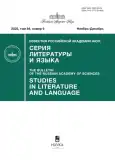The Bulletin of the Russian Academy of Sciences: Studies in Literature and Language
Izvestiya RAN. Seriya literatury i yazyka (The Bulletin of the Russian Academy of Sciences: Studies in Literature and Language), founded in 1852 by Academician Izmail I. Sreznevsky, is the oldest academic journal in Russia for scholars of philology.
Publication history: from 1852 to present.
Founders
- Russian Academy of Sciences
Publisher
- Russian Academy of Sciences
The journal is published under the supervision of the RAS Department of Historical and Philological Sciences (OIFN RAS).
About the journal
As the official journal of the Division of Historical and Philological Studies of the Russian Academy of Sciences (in Russian, ОИФН РАН), Izvestiya RAN. Seriya literatury i yazyka (The Bulletin of the Russian Academy of Sciences: Studies in Literature and Language) is committed to carrying on the Russian philological traditions while seeking to publish innovative research.
The journal offers papers on aspects of literary and linguistic studies, including discussions of fundamental philological works, review articles and chronicles, and transactions of the Division of Historical and Philological Studies of the RAS. One of the journal’s main sections is devoted to resurrection of undeservedly disregarded events from the history of philological scholarship in our country.
Among The Bulletin of the Russian Academy of Sciences: Studies in Literature and Language’s contributors there are Academicians and correspondent members of the Russian Academy of Sciences, researches from academic institutes, many internationally recognized scholars from Moscow, Saint Petersburg, different Russian regions, as well as eminent scholars from other countries.
Editor-in-Chief
- Vadim Polonsky, Corresponding Member of the RAS, Dr. Sci. (Philology), Prof., A.M. Gorky Institute of World Literature of the Russian Academy of Sciences (Moscow, Russia)
Editorial Staff
- Deputy Editor-In-Chief – Leonid Krysin, Dr. Sci. (Philology), Prof., V.V. Vinogradov Russian Language Institute of the Russian Academy of Sciences (Moscow, Russia)
- Executive Editor – Alexander Piperski, Cand. Sci. (Philology), Higher School of Economics (Moscow, Russia)
- Scholarly Editor – Vladimir Korovin, Dr. Sci. (Philology), Assoc. Prof., Lomonosov Moscow State University (Moscow, Russia)
- Editorial Manager – Olga Lukashenko
Subjects
Literature and Language, Linguistics, History of Russian and World Literature, Literary Theory, Folklore Studies, Aspects of History of Art.
Main Headings
- Original Papers
- From the History of Philology
- Reviews
- Chronicles
Frequency
The journal is published bi-monthly (6 issues per year).
Indexing
- RSCI (Russian Science Citation Index) by Clarivate Analytics and eLIBRARY.RU
- ERIH PLUS
- Citation Index by eLIBRARY.RU (Scientific Electronic Library)
- Crossref
The journal is included in the Russian Higher Attestation Commission List of peer-reviewed scientific publications.
Current Issue
Vol 84, No 6 (2025)
Articles
Pushkin Digital: Institutional Experience of the Digital Transformation of the Academic Edition of the Classics
Abstract
 5-11
5-11


Count Nulin, W. K. Küchelbecker, and Prince P. A. Vyazemsky
Abstract
 12-20
12-20


Nina Berberova’s Comedy Madame within the Field of Literary Traditions
Abstract
The article explores the system of literary codes and their functions in Nina Berberova’s comedy Madame. Staged by the Russian Drama Theatre in Paris, the play reflected the theatre’s pursuit of contemporaneity and its effort to renew the language of drama. The work may be read both as a domestic comedy and as a melodrama. It reconstructs recognizable emigration realities and conventional plot motifs, yet the conspicuousness of these elements appears intentional. In her memoirs Berberova explicitly opposed her comedy to the tradition of realist theatre. The plot, along with the density of reminiscences, the use of grotesque, and the deliberate exposure of theatrical devices, brings Madame close to Vladimir Nabokov’s The Event, staged in the same theatre six months earlier. In both plays, the inauthenticity of life is revealed through the metaphor of the world as theatre. In Berberova’s play, the capacity to break free from the bonds of literary secondariness and from the tyranny of fate is asserted as a central value.
 21-28
21-28


The “Depicted Word” in the Structure of Lyric Discourse in G. R. Derzhavin
Abstract
 29-35
29-35


Mythopoetic Aspects in the Plays of Elena Isaeva
Abstract
 36-48
36-48


Exotic Kinship Vocabulary (Based on the Arkhangelsk Dialects)
Abstract
 49-56
49-56


“Katerina, ty prichina, chto lishen muzhchina china” (“Katerina, You’re the Reason That a Man Has Lost His Rank”): On the Features of Nikolai L’vov’s Rhyme
Abstract
 57-66
57-66


The History of the Relationship between I. S. Shmelev and G. D. Grebenshchikov: New Materials
Abstract
 67-78
67-78


Intonational Means of Expressing Modality in Interrogative Sentences (with Reference to Why-Questions)
Abstract
 79-87
79-87


The Use of Ordinal Numerals in Various Semantic Contexts (Based on Parallel Translations of the New Testament)
Abstract
 88-102
88-102


Fairy-Tale Elements in Virginia Woolf’s Short Story “Lappin and Lapinova”
Abstract
 103-111
103-111


On the Problems and Prospects of Transcriptional Textology
Abstract
 112-123
112-123


Chronicles
International Scientific Conference “The Chekhov Phenomenon: The Silver Age Between Classics and Modernism (Dedicated to the 165th Anniversary of the Writer’s Birth)”
 124-141
124-141


*****
Index of Authors, Volume 84, 2025
 142-144
142-144












